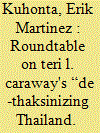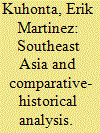| Srl | Item |
| 1 |
ID:
142007


|
|
|
| 2 |
ID:
082794


|
|
|
|
|
| Publication |
2008.
|
| Summary/Abstract |
Thailand's adoption of a new constitution in 1997 was meant to advance far-reaching reforms in the country's democratic development. A decade later, it is clear that these constitutional reforms failed. The Constitution unintentionally consolidated Prime Minister Thaksin's grip on power and indirectly precipitated the conditions for the 2006 coup. This article argues that the drafters' search for a more stable democratic government helped produce an electoral authoritarian regime that triggered the military to intervene
|
|
|
|
|
|
|
|
|
|
|
|
|
|
|
|
| 3 |
ID:
177619


|
|
|
|
|
| Summary/Abstract |
Teri Caraway's very insightful paper asks us to re-think the extent to which institutions played a significant role in the electoral victories of Thaksin Shinawatra and his Thai Rak Thai Party (and their subsequent incarnations). Arguing against the so-called “institutionalists,” Caraway argues that constitutional and electoral rules did not matter in generating TRT's victory, but rather had temporal and nuanced effects. First, they mattered in terms of the magnitude of TRT's 2001 electoral win but did not explain the electoral results in and of themselves. Second, institutions helped consolidate TRT's power and were crucial in enabling the party to successfully implement its programmatic platform and therefore solidify a very loyal mass base. But once a mass base became consolidated in support of TRT, institutional engineering was subsequently less effective in shaping electoral outcomes. What Caraway most crucially shows is that one has to break down the causal effect of institutions temporally and draw a distinction between their role in a founding (and “unsettled”) moment, and then as mechanisms of reproduction.
|
|
|
|
|
|
|
|
|
|
|
|
|
|
|
|
| 4 |
ID:
133786


|
|
|
|
|
| Publication |
2014.
|
| Summary/Abstract |
This article seeks to assess the contributions and key characteristics of comparative-historical analysis in the field of Southeast Asian studies. It does so by examining three specific issues that emerge from this methodological genre: the conceptualization of the region of Southeast Asia, the role of theory, and the emphasis on macro structural ontology. These issues are analyzed in three disciplines: political science, history, and anthropology. The article shows that dialogue among comparative-historical researchers is most evident within the disciplines of political science and history. In anthropology, important comparative-historical work has also been produced but it has been less engaged within the comparative-historical canon. In reviewing these three disciplines' shared analytical concerns as well as contributions to comparative-historical analysis, the article makes an implicit case for greater interdisciplinary engagement across the disciplines.
|
|
|
|
|
|
|
|
|
|
|
|
|
|
|
|
| 5 |
ID:
092232


|
|
|
|
|
| Publication |
Stanford, Stanford University Press, 2008.
|
| Description |
xviii, 455p.
|
| Standard Number |
9780804761529
|
|
|
|
|
|
|
|
|
|
|
|
Copies: C:1/I:0,R:0,Q:0
Circulation
| Accession# | Call# | Current Location | Status | Policy | Location |
| 054598 | 320.0959/KUH 054598 | Main | On Shelf | General | |
|
|
|
|
| 6 |
ID:
074430


|
|
|
|
|
| Publication |
2006.
|
| Summary/Abstract |
Since 1967, ASEAN has established intramural relations that forsake war as a means for resolving conflict. While this is a remarkable achievement for the region, it must be balanced against a concomitant hindrance of democratic reform. I argue in this paper that ASEAN's nascent security community must be seen as an 'illiberal peace'. Underlying ASEAN's peaceful community are the same principles that support illiberalism in the region, namely sovereignty and non-interference. While sovereignty has historically been a cherished norm for developing countries, ASEAN lags behind other regions, particularly Latin America, in attempting to reconcile tensions between democratic norms and the respect for sovereignty. This tension is most evident in ASEAN's relations with Myanmar. Recent events indicate that ASEAN's non-interference norm may no longer be sacrosanct, but the association is a long way from shunning illiberal politics for the sake of democratic values.
|
|
|
|
|
|
|
|
|
|
|
|
|
|
|
|